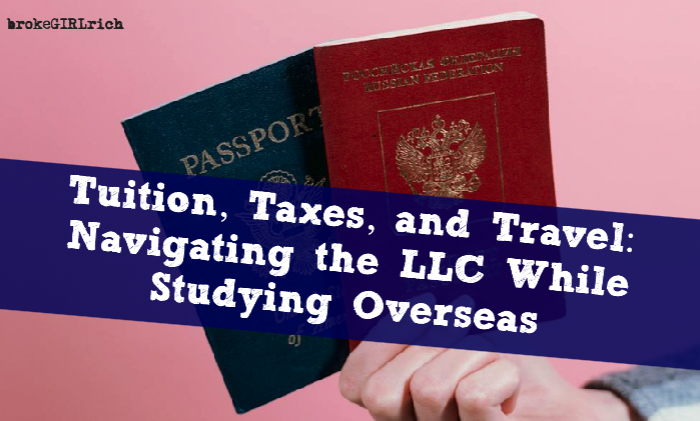
Tuition, Taxes, and Travel: Navigating the LLC While Studying Overseas | brokeGIRLrich
The Lifetime Learning Credit (LLC) serves as a significant tax advantage for U.S. taxpayers seeking higher education, offering a financial break on tuition and other qualified expenses. While this credit can provide substantial support, American students studying abroad face specific challenges in claiming it. This article will delve into the Lifetime Learning Credit, its eligibility requirements, and the unique difficulties that U.S. students enrolled in international institutions may encounter.
Overview of the Lifetime Learning Credit (LLC)
The Lifetime Learning Credit is a federal tax credit aimed at offsetting the costs associated with higher education for qualifying students. Unlike other educational credits, such as the American Opportunity Tax Credit (AOTC), which is restricted to undergraduate students, the LLC encompasses a wider array of educational experiences, including undergraduate, graduate, and professional degree courses. This makes it especially beneficial for individuals looking to enhance their skills, switch careers, or pursue further coursework.
Key Features of the LLC
- Credit Amount: The LLC offers a credit of up to $2,000 per tax return, calculated as 20% of the first $10,000 of qualified educational expenses.
- No Yearly Limit: The LLC can be claimed without a limit on the number of years, unlike the AOTC, which is available for only four years per student.
- Eligible Expenses: The credit covers tuition and mandatory fees needed for enrollment but does not extend to living expenses, transportation, or medical insurance.
- Income Limits: The credit begins to phase out at a modified adjusted gross income (MAGI) of $80,000 for single filers, and $160,000 for married couples filing jointly (as of the 2023 tax year).
- Non-refundable: Unlike the AOTC, the LLC is non-refundable, meaning it can reduce tax liability to zero but does not allow for a refund beyond the amount of tax owed.
Challenges for U.S. Students Abroad
Despite the benefits of the LLC, American students studying at foreign universities often face several challenges in claiming the credit. Here are some notable issues:
- Eligibility of Foreign Institutions
To claim the LLC, the institution must be recognized as an Eligible Educational Institution (EEI) by the U.S. Department of Education and participate in the Federal Student Aid (FSA) program. Unfortunately, many foreign universities do not qualify for these programs, which can hinder students’ ability to claim the credit.
Currently, I am facing this issue myself—upon researching, I discovered that my school does not meet the criteria as it is not an EEI and lacks an Employer Identification Number (EIN). This was quite disheartening, especially considering the numerous bureaucratic hurdles I’ve navigated with my school’s financial and administrative matters. Knowing that I’ve missed out on three years of potential $2,000 tax credits is particularly frustrating.
Solution: Students should verify if their foreign institution has an EIN and if it participates in U.S. Department of Education programs before presuming they qualify for the LLC.
- Currency Exchange and Documentation of Expenses
Foreign institutions often charge in their local currencies, complicating the determination of qualified expenses in U.S. dollars. The IRS mandates detailed documentation for tuition payments, and fluctuating exchange rates can further complicate these calculations.
Solution: Students are advised to maintain meticulous records, including receipts, bank statements, and the exchange rate applicable on the date of payment, to ensure accurate reporting.
- Complexities in Tax Residency and Filing
Many American students studying abroad may struggle with defining their tax residency status. The IRS requires U.S. citizens to report their worldwide income, and living overseas may introduce additional considerations, including foreign income exclusions and tax treaty implications.
Solution: Consulting a tax professional can help students understand how their residency status influences eligibility for the LLC and other tax benefits.
- Lack of Form 1098-T from International Institutions
In the U.S., institutions provide Form 1098-T (Tuition Statement) to students, which simplifies claiming educational tax credits. In contrast, foreign universities are typically not obligated to provide this form, making it harder for students to substantiate their claims.
Solution: Students can still claim the LLC using alternative documentation, such as tuition invoices, bank statements, and proof of payment. However, this could increase the risk of an IRS audit or further inquiries for additional information.
Conclusion
The Lifetime Learning Credit is an exceptional tax benefit that promotes lifelong education. However, American students studying abroad must navigate specific challenges to access it. Ensuring the eligibility of foreign institutions, maintaining comprehensive financial records, and understanding the tax implications are crucial for claiming this credit effectively. Given the complexities involved, seeking assistance from a tax professional can enable students to maximize their education benefits while adhering to U.S. tax regulations.




